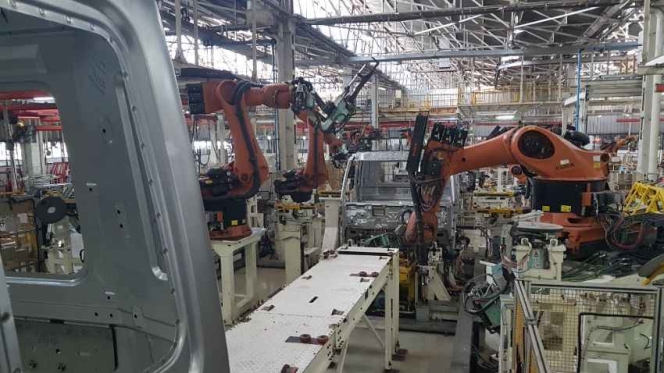
Witnessing manufacturing modernisation since Maruti Udyog began producing cars in collaboration with Suzuki of Japan at Gurgaon in 1984, the Indian auto industry landscape has drastically changed. Opening up to automation with the installation of some of the best robots available at Kuka, ABB and others, the auto industry has left no stone unturned. Such has been the fervor that Tal, a Tata Motors company, launched a robot called Brabo in 2018 to make manufacturing processes involving the application of sealants, picking and placing of parts, welding and vision inspection reliable and easy to perform. Made with an eye on manufacturing process the world over, the Brabo was tested in over 50 work streams and has so far found use in sectors like lighting, aerospace, software, electronics, plastics, education and logistics sectors apart from the auto industry. Coming from an auto maker that installed 300 Kuka robots to automate the assembly of Sumo and Safari at its Pune plant in 2009, the Brabo has seen many rounds of development and application-preparedness since its launch.
Smart manufacturing trend
Highlighting the smart manufacturing trend, the TAL Brabo robot with payloads of two and 10 kilos has also found favour with companies in Europe and other places. Highlighting the prowess of Artificial Intelligence (AI) and Internet of Things (IoT), the robot is an example of the fast-changing manufacturing canvas. Producing about 1,286 engines per day, the Igatpuri plant of Mahindra & Mahindra became India's first carbon-neutral manufacturing facility by adopting smart manufacturing practices under Industry 4.0 in 2019. It invested in energy efficient technologies among others. It invested in recycling of water and other waste. It invested in solar panels to power some of its processes in the plant. An industry source expressed that the rapidly changing business environment the world over is providing impetus to smart manufacturing. It is driving efficiency enhancements and collaborations, he added. Emphasising on efficiency enhancements and collaborative efforts as key smart manufacturing drivers, an industry expert stated that technologies like AI, Industrial Internet of Things (IIoT), automation, big data and 5G are the biggest triggers. They are touching every aspect of manufacturing, from sourcing of raw materials to final inspection, he quipped.

Industry 4.0
As companies like Lincode (it has collaborated with Switzerland-based Global Automotive Alliance), specialising in AI-powered visual inspection with multiple patent-pending defect detection capabilities, find more and more takers in India, the smart manufacturing shift is continuing to take place despite disruptions. It has, in fact, gained speed in India with the race to successfully accomplish BS VI transition in the last few years. A source in the auto industry mentioned that BS VI transition led to manufacturers upping their global ambitions. Vinay Raghunath, Partner and Leader, Automotive Sector, EY India, averred in a report that automotive shop floors are evolving and adopting digital technologies. This, he added, is happening amid challenges like slowdown in demand, non-availability of labour, concerns on health and safety management on the shop floor. Witnessing disruptions relating to ROI among other factors, as Raghunath has informed, the Indian auto industry has been an early adopter of digital manufacturing techniques.
Working to dial higher efficiency, expertise and superior productivity, the Indian auto industry has been overhauling existing assembly lines, erecting new ones and extensively re-evaluating its manufacturing processes and practices in view of smart manufacturing, especially from an automotive value chain point of view. Taking to Industry 4.0, it is leveraging AI and IoT-based manufacturing technologies to automate further – to engage in machine-to-machine communication (M2M) such that there is self-monitoring as well as self-diagnosing. Taking to Industry 4.0 to tackle unanticipated disruptions like the Covid-19 pandemic, which has put well-oiled supply chains and production lines to the test and made it painfully clear that they in their current form are not as agile or resilient as expected, the auto industry is shifting to smart manufacturing in a big way. It is exploring and experimenting; it is finding new ways. It is doing so as it absorbs a significant change in technologies and products like electrification and EVs.
Operator 4.0 and hyper-intelligence
Investing heavily in data analytics infrastructure and capabilities, the auto industry is leveraging opportunities to digitally transform itself. It is defining the boundaries of physics for data-driven model. It is focusing on digital skills development. It is supporting the rise of Operator 4.0. Taking to collaborative robots that coexist with humans in a workplace, it is transforming its ways of manufacturing significantly. Drawing attention to the semi-conductor shortage and how the auto industry was affected despite using only 10 percent of the production, Vipin Sondhi, Managing Director, Ashok Leyland, explained that the rapidly changing consumer psyche is dictating a move to a completely different technological aspect. Emphasising on material technology, he said smart manufacturing is about digitising and achieving cost competitiveness. It was some two to three years ago that the Chennai-based CV maker began implementing smart manufacturing technologies to mitigate challenges. It took to modernising and digitising existing workplaces to address quality issues that are difficult for human beings to detect and acquire made-to-order or mass customisation capabilities. It took to equipping itself with an ability to expand and contract in tandem with the market conditions even as it took to modularisation of product lines.
Automating its cab panel pressing plant at Hosur in 2019, which increased the output by up to 66 percent, Ashok Leyland has been one of the many automotive OEMs globally that are investing in hyper-intelligent automation. A confluence of AI and Robotic Process Automation (RPA), hyper-intelligent automation is redefining not just Industry 4.0 but also Operator 4.0. It is facing challenges like the high initial acquisition cost in terms of tools, but that isn’t worrying players involved like Tata Consultancy Services, Wipro, Mitsubishi Electric Corporation, Catalytic Inc and Infosys Limited among others. Estimated to grow at a CAGR of 18.9 percent as manufacturers strive to reduce energy consumption, up quality and reliability, and control costs through predictability and data-driven unique insights, hyper-intelligent automation is turning out to be yet another finer aspect of smart manufacturing. It is proving to be a big enabler for automating repetitive tasks – to enhance efficiencies, to take to cloud computing to ensure significantly more flexibility and to achieve scalability and the ability to collaborate and reduce costs.

Increasing visibility, predictability and enhancing control on operations and inventory, hyper-intelligent automation is aiding effective decision-making. Supported by development of new technologies such as 5G, which according to a domain expert, promises the need for speed and flexibility along with the capability to eliminate network instability or downtime, hyper-intelligent automation is helping automotive suppliers like Rane Madras Limited to make efficiency, reliability and cost control gains. In 2018, the company adopted automated solutions of Mistubishi Electric Corporation for its new plant in Gujarat. It led to a significant decrease in energy consumption. Aiding smart manufacturing, technologies like hyper-intelligent automation and 5G are helping the auto industry to achieve resilience and immunity against future uncertainties. They are helping to integrate Information Technology (IT) systems used for data-centric computing with Operational Technology (OT) systems – for data readiness and cyber security, and for the development of digital talent. Technologies like hyper-intelligent automation and 5G are helping to develop cross-functional profiles like engineering-manufacturing, manufacturing-maintenance and safety-security.
Tackling disruptions and smart working environment
Looking at productivity gains, emerging competition and risk aversity in the globalised world as per the EY report, the auto industry is taking to smart manufacturing to achieve significant technology transformations like electromobility as well. Apart from the creation of a smart working environment, it is also looking at the use of new materials, new process guidelines and practices. With health also becoming a disruptive factor in recent times, the auto industry is looking at automation in processes like inbound logistics, production planning, sourcing, press shop, body shop, paint shop, quality control and outbound logistics through data visualisation. With sensors and analytics shaping up, the smart working environment in a factory is coming to include AI-based alerts and fully automated work floors. This is increasingly getting compounded by data collection, historical data and high-quality extensive data mining. Helping to guarantee ROI, smart manufacturing is helping to lower the ‘takt’ time. It is also ironically undermining the involvement of humans on the shop floor.
Reducing the cost of computation, storage and connectivity, smart manufacturing is coming of age with plummeting prices of sensors, 3D printers and robots. Empowering cloud-based manufacturing techniques and a gradual increase in the understanding of emerging technologies, smart manufacturing is providing an advantage in terms of the ability to respond to market changes quickly. Taking to develop a new light-duty truck platform with export ambitions and flexibility in terms of left-hand drive and right-hand drive orientation, VE Commercial Vehicles Ltd took to automating its welding line with robots at its Pithampur plant. It also took to robotising its windshield pasting station among others. Experiencing quality, consistency, efficiency and cost gains, the CV maker is also known to have reduced the takt time and energy consumption. As global ambitions and modularity strike in view of the ability to explore new export markets with a cost competitive BS VI product, the auto industry in India is using embedded sensors, RFID and GPS etc. for smart tracking. It is using smart manufacturing technologies to monitor parameters like temperature, pressure, vibration, machine rpm and flow rate.

Smart flexibility
As part of a shift to smart manufacturing, automakers and suppliers are resorting to flexible manufacturing and AR-based solutions to upskill. They are, in view of the technologies like connected vehicles and EVs, stressing on re-aligning their traditional manufacturing setups with that of the future. Emphasising on quality, resource optimisation, streamlining of business processes and adoption of new emerging technologies, they are closely evaluating the advantages of solutions like digital twins and rapid prototyping using additive manufacturing offer. With ROI on their mind, they are embracing smart manufacturing to move up the value chain.
Tata Motors’ PV And CV Sales In The Negative, Outlook Remains Positive
- By MT Bureau
- July 01, 2025
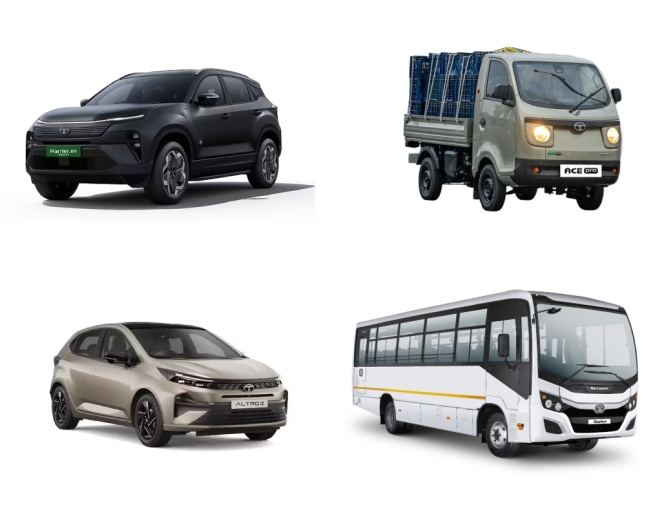
Tata Motors, one of the leading passenger vehicle and commercial vehicle manufacturers in the country, has announced its wholesales for June 2025 and Q1 FY2026.
The company reported that its total PV sales came at 124,809 units in Q1 FY2026, down 10 percent from Q1 FY2025 on a YoY basis. Domestic PV sales, including EVs, came at 123,839 units, down 10 percent YoY. For June, PV sales came at 37,083 units, down 15 percent compared to the same period last year.
| TATA MOTORS PASSENGER VEHICLES | ||||||
| June '25 | June '24 | Change (in %) | Q1 '26 | Q1 '25 | Change (in %) | |
| PV Domestic (includes EV) | 37,083 | 43,524 | -15% | 123,839 | 138,104 | -10% |
| PV IB | 154 | 100 | 54% | 970 | 578 | 68% |
| Total PV (includes EV) | 37,237 | 43,624 | -15% | 124,809 | 138,682 | -10% |
| EV (IB + Domestic) | 5,228 | 4,657 | 12% | 16,231 | 16,579 | -2% |
Shailesh Chandra, Managing Director, Tata Motors Passenger Vehicles and Tata Passenger Electric Mobility, said, “In Q1 FY2026, the passenger vehicle industry experienced volume pressures, particularly in May and June, with flat growth reflecting continued softness in demand."
"The electric vehicle segment emerged a bright spot, driven by robust growth and the launch of new EV models across OEMs, enhancing customer interest and consideration. Tata Motors reported wholesales of 124,809 units in Q1 FY2026, including 16,231 EV units, underscoring our commitment to aligning wholesale and registration volumes. EV sales gained strong momentum towards the end of the quarter with a healthy growth trajectory. The refreshed Tiago posted 16 percent YoY volume growth in Q1 FY2026 and new launches – Altroz and Harrier.ev – saw a positive market response, with their full impact expected in the coming months,” he said.
On the other hand, Tata Motors’ commercial vehicle (CV) business reported sales of 85,606 units, down 6 percent YoY for Q1 FY2026. Domestic CV sales at 79,572 units, were down 9 percent as compared to Q1 FY2025.
In June 2025 alone, total CV sales came at 30,238 units, which is 5 percent lower than June 2024. In the domestic market, the demand for Medium and Heavy Commercial Vehicles (MH&ICV) came at 12,871 units, as against 4,640 units for the same period last year. During Q1 FY26, MH&ICV domestic sales were 37,370 units as against 40,349 units in Q1 FY25.
| TATA MOTORS COMMERCIAL VEHICLES | ||||||
| June '25 | June '24 | Change (in %) | Q1 '26 | Q1 '25 | Change (in %) | |
| HCV Trucks | 7,359 | 8,891 | -17% | 21,735 | 24,690 | -12% |
| ILMCV Trucks | 4,863 | 4,997 | -20% | 14,497 | 13,791 | -20% |
| Passenger Carriers | 5,658 | 5,654 | 4% | 15,089 | 14,893 | 9% |
| SCV Cargo & Pickup | 10,056 | 11,081 | 1% | 28,251 | 34,241 | 4% |
| Total CV Domestic | 27,936 | 30,623 | -9% | 79,572 | 87,615 | -9% |
Girish Wagh, Executive Director, Tata Motors, said, “Q1 FY26 began on a subdued note for the commercial vehicle industry with muted performance in the HCV and SCVPU segments while buses, vans and ILMCVs registered modest year-on-year growth. Tata Motors Commercial Vehicles recorded domestic sales of 79,572 units, 9.2 percent decline compared to Q1 FY25."
"However, June 2025 witnessed a sequential growth of 8 percent over May 2025. Additionally, our International Business delivered a robust 67.9 percent growth in volumes over Q1 FY25. During the quarter, we launched India’s most affordable mini-truck, the Ace Pro, offered in petrol, bi-fuel and electric powertrains, which received an encouraging market response. We enhanced driver comfort by introducing air-conditioned cabins across our entire range of light to heavy trucks. We also expanded our international footprint by entering Egypt and expanded our offerings for the Middle East North African region,” Wagh added.
Going forward, Wagh stated that with forecasts for a healthy monsoon across the country, a reduction in repo rate and renewed thrust on infrastructure development, will bring back sales momentum for the commercial vehicles segment.
Chandra too shared his optimism for the PV market and stated, “Looking ahead, while overall industry growth is expected to remain subdued, Tata Motors is well positioned to leverage its new launches to outperform across segments—including hatchbacks and SUVs, while continuing to build on the EV momentum.”
Tata Motors Achieves Record FY2025 Performance, Becomes Debt-Free & Advances Demerger
- By MT Bureau
- June 20, 2025
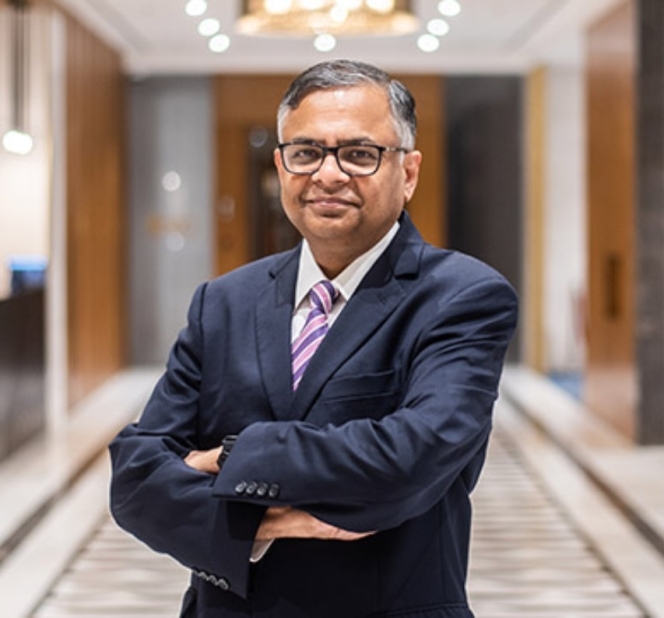
Tata Motors, one of the country’s largest automakers, has announced a landmark financial performance for FY2025, achieving record revenues and profitability, becoming debt-free, and confirming the ongoing process to demerge into two independent listed entities. The announcement was made by N Chandrasekaran at the 80th AGM of Tata Motors, on 20 June 2025.
In his address, he mentioned that on a consolidated basis, the Tata Motors Group delivered record high revenue of INR 4,396 billion, a record EBITDA of INR 576 billion, and a record Profit Before Tax (PBT) of INR 343 billion (before exceptional items). This robust performance has enabled the Tata Motors Group to achieve a debt-free status this year.
The company highlighted strong individual performances across its business segments:
- Commercial Vehicles (CV): Achieved INR 751 billion in revenue, a record EBITDA of INR 88 billion, and INR 75 billion in Free Cash Flows, with a strong ROCE of 37.7 percent.
- Passenger Vehicles (PV): Generated revenues of INR 484 billion with a 0.9 percent EBIT. The Tata Punch emerged as India’s top SUV, with CNG and EVs comprising 36 percent of its multi-powertrain portfolio.
- Jaguar Land Rover (JLR): Delivered solid results with revenues of GBP 28.9 billion and an 8.5 percent EBIT, resulting in a PBT of GBP 2.5 billion, turning net cash this year. The Range Rover and Defender franchises continued their strong performance, complemented by localized CKD manufacturing of Range Rover and Range Rover Sport in India.
The strategic demerger process, which will see the company operate as two independent listed entities – one for Commercial Vehicles and one for Passenger Vehicles and JLR – is well underway and expected to be completed by the end of the calendar year.
Chandrasekaran mentioned that each business is positioned for independent growth, supported by strengthened financials and dedicated management teams.
Despite anticipated future volatility from geopolitical conflicts, supply chain shifts, AI, and energy transition, he stated its businesses are structured to thrive, building on years of simplification and strategic investments.
The company also acknowledged the recent passing of Mr. Ratan Tata, noting his profound impact and enduring legacy on the Group.
- Indian School for Design of Automobiles
- INDEA
- Nitin Gadkari
- XLRI
- Avik Chattopadhyay
- XADM
- Fr. Dr. K.S. Casimir
India's First Automotive Design Institute Breaks Ground in Delhi-NCR
- By MT Bureau
- June 17, 2025
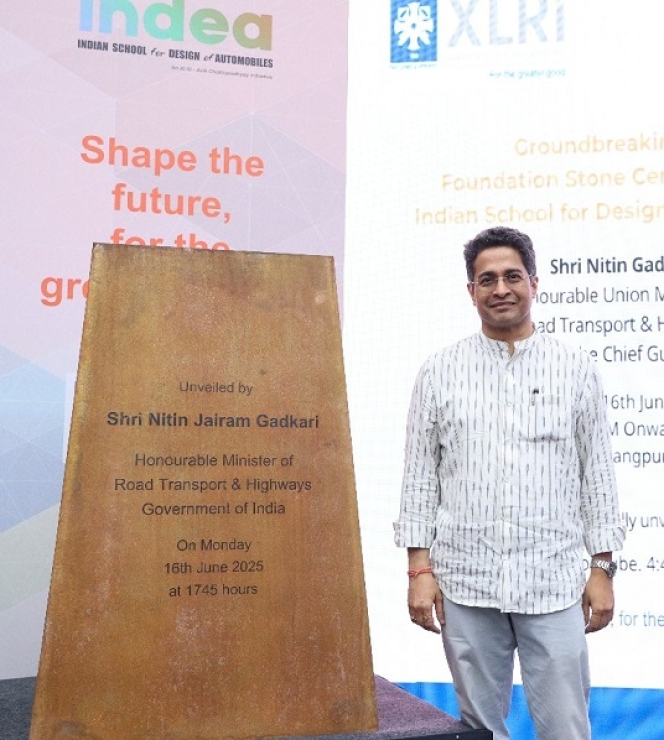
India's automotive sector is poised for a significant transformation with the establishment of the Indian School for Design of Automobiles (INDEA), the nation's first dedicated institution for automobile design and management. A groundbreaking and foundation stone ceremony was held today at the XLRI Delhi-NCR campus, marking a historic milestone for the nascent institute.
The Union Minister of Road Transport and Highways, Nitin Gadkari, served as the Chief Guest, virtually unveiling the foundation stone and offering his full support for the forward-thinking initiative. His virtual presence underscored the government's recognition of design's crucial role in India's evolving mobility landscape.
The ceremony brought together a distinguished gathering, including industry titans, senior government officials, design and automotive professionals and academic luminaries. The consensus among attendees was clear: design is rapidly gaining importance within India's mobility ecosystem, and INDEA is positioned to be a cornerstone of this shift.
Developed under the umbrella of XLRI’s Centre for Automobile Design & Management (XADM), INDEA aims to revolutionise design education in India. Avik Chattopadhyay, Founder of INDEA and Chairperson of XADM, is leading the charge to cultivate a new generation of automotive designers and visionaries. The institute's mission is to equip these future professionals with the skills needed to meet both global standards and unique local requirements.
A striking steel structure, named Param – a Sanskrit word signifying supreme, highest, or ultimate – was unveiled as the foundation pillar. Designed by renowned Indian installation artist and designer Vibhor Sogani, the skyward-reaching sculpture symbolises INDEA's aspirations for boundless growth and transformative knowledge. Param is envisioned as the symbolic heart of the institute, representing not just a foundation but a future hub for innovation and excellence with state-of-the-art facilities fostering a community of innovators, thinkers and leaders in automotive design.
In his virtual address, Nitin Gadkari emphasised the automotive sector's critical role in India's economic growth, employment generation and global competitiveness. "As we strive towards the Prime Minister’s USD 5 trillion economy vision, our industry is evolving from being cost-driven to quality-led, anchored in smart design, robust safety, and sustainable practices. The future will be shaped by strong R&D, innovation, and next-generation testing and certification. I am confident that the young talent trained at INDEA will become catalysts for change, turning knowledge into innovation, and innovation into national strength."
Fr. Dr. K.S. Casimir, Director, XLRI Delhi-NCR, said, "This ceremony marks a major leap in our vision of creating an institute that seamlessly blends design thinking, technical prowess, and industry alignment. Nitin Gadkari’s digital presence as Chief Guest is not only an honour but also a strong endorsement of the vital role that design can play in India’s mobility future."
Avik Chattopadhyay echoed these sentiments, asserting, "INDEA is designed to be more than just an educational institute – it is a movement to elevate India’s design capabilities. With the encouragement of leaders like Nitin Gadkari and guided by the vision of our Prime Minister Narendra Modi, we are confident INDEA will become a key enabler in India’s journey to becoming a global design and innovation hub."
- Freudenberg
- Freudenberg Training Centre
- TVS Motor Co
- Hyundai Motor India
- Simpson Group
- Esther Maria Loidl
- G Sivasailam
- Dr Chitrakala Mohan
Freudenberg Expands Vocational Training Centre in Nagapattinam to Boost Youth, Women’s Empowerment
- By MT Bureau
- June 12, 2025
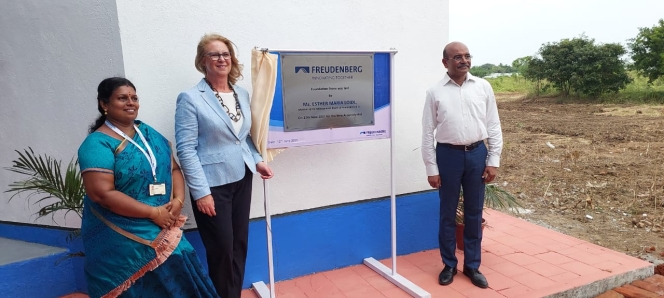
German technology giant Freudenberg Group has announced the expansion of its Freudenberg Training Centre in Nagapattinam, Tamil Nadu, reinforcing its long-term commitment to community development in India.
Esther Maria Loidl, Chief Human Resources Officer and global board member of Freudenberg & Co., laid the foundation stone for a new extension and auditorium at the training campus. The upgrade will include converting the existing auditorium into a computer lab, with a focus on offering digital and computer-based vocational courses. The new facilities are expected to be completed by mid-2026.
The expansion aims to attract and support more women students, equipping them with skills for financial independence and sustainable employment. The centre, established in 2008 in the aftermath of the 2004 tsunami, offers training in welding, fitting, machining, motor mechanics and electrical work. It has trained over 1,400 students to date, many of whom are now employed at leading firms such as Hyundai Motor India, TVS Motor Co and Simpson Group, while some have launched their own ventures.
Freudenberg has invested over INR 400 million in the region over the past 16 years. The 28-acre training campus is staffed by 18 qualified educators and led by Principal Dr Chitrakala Mohan.
Esther Maria Loidl, said, “It’s a pleasure and privilege to lay the foundation for further expansion of our largest CSR initiative in India - the Freudenberg Training centre in Nagapattinam. The institute’s growth affirms the visionary decision in 2008 to support the region’s rebuilding by empowering its young people with the right vocational skills. We look forward to investing and supporting the institute to grow further in its noble mission to power the aspirations of the needy in this region.”
G Sivasailam, Director & CEO, Freudenberg Regional Corporate Center India & Managing Director, Freudenberg Performance Materials India, said, "I am immensely proud to see the growth of the institute to where it is today. This reaffirms many of the core values of the Freudenberg group – long-term commitment, proactive and responsible action, among others. I would like to credit the Principal and her faculty who have been instrumental in ensuring the delivery of quality education to the local youth. They have been constantly innovating and adding to the courses and teaching pedagogy to what it provides is needed in the industry.”
Dr Chitrakala Mohan, Principal, Freudenberg Training Center, said, “It has been a great journey leading this visionary initiative for 7 years. The whole-hearted and passionate support we receive from the group executives in India and at the global HQ has been pivotal to whatever we’ve been able to accomplish so far. The foundation laying today and the other initiatives in the pipeline will help us expand sustainable community development through world-class vocational education, which sees local youth gainfully employed with leading companies in India.”


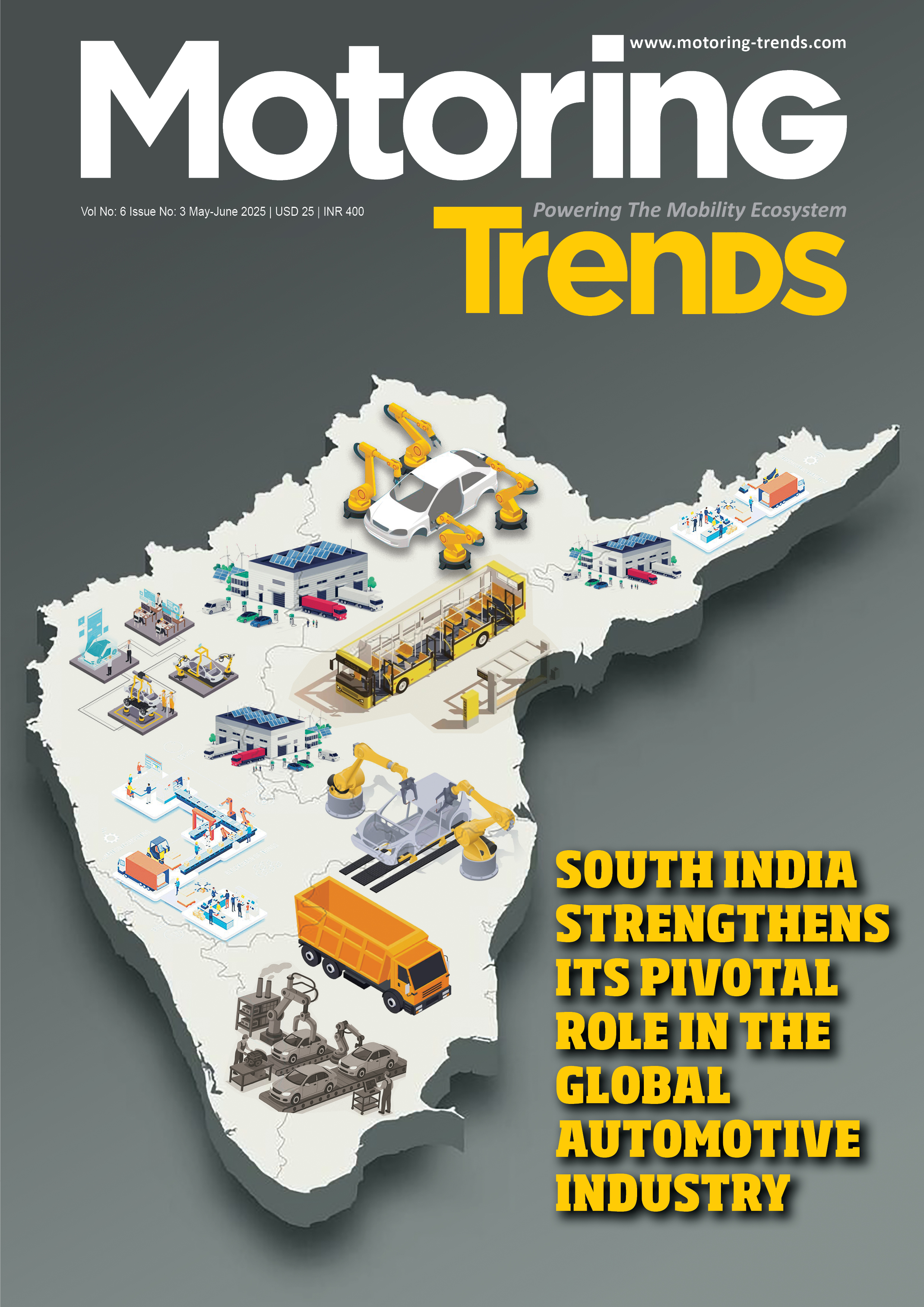
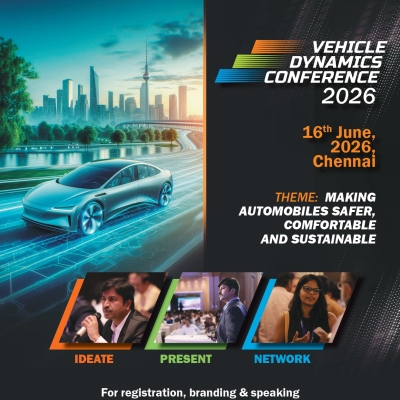
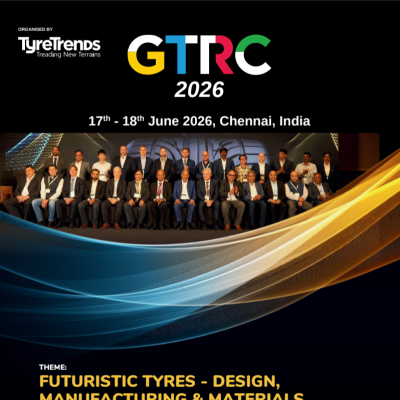
Comments (0)
ADD COMMENT